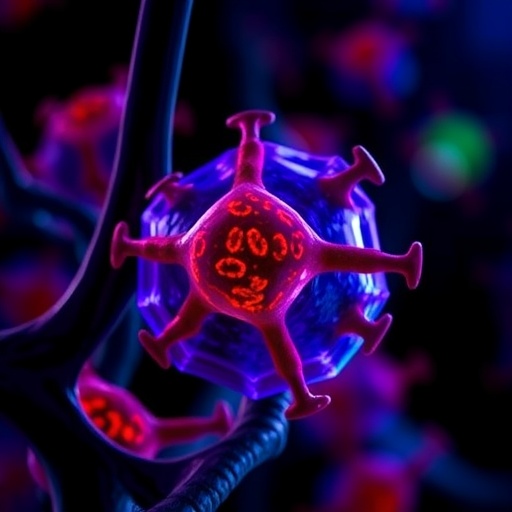In a groundbreaking advancement heralding a new era in cancer immunotherapy, scientists have engineered a monoclonal antibody that remarkably inhibits the shedding of CD16a and CD16b, two pivotal Fc gamma receptors, profoundly enhancing the antibody-dependent cellular cytotoxicity (ADCC) against tumor cells. This innovative study, recently published in Nature Communications, reveals unparalleled insights into manipulating the immune system’s natural mechanisms to bolster anti-tumor responses, potentially revolutionizing current therapeutic strategies.
Natural killer (NK) cells and certain subsets of myeloid cells rely heavily on the expression of CD16, a key receptor facilitating the recognition and destruction of antibody-coated cancer cells through ADCC. However, a major limitation in this process is the proteolytic shedding of these receptors from the immune cell surface, a phenomenon that diminishes their efficacy in targeting tumor cells. The shedding impairs immune surveillance by reducing receptor density on effector cells, thereby weakening the critical crosslinking events necessary for activating cytotoxic pathways.
Addressing this fundamental challenge, the team led by da Silva Bortoleti and colleagues devised a monoclonal antibody specifically designed to block the proteolytic cleavage sites responsible for CD16a and CD16b shedding. By preventing this receptor loss, the engineered antibody sustains receptor expression on immune cells, maintaining their capability to engage with tumor-associated antibodies. This sustained presence ensures robust activation of downstream signaling cascades critical for inducing apoptosis in malignant cells.
The researchers meticulously characterized the biochemical interaction between the monoclonal antibody and the ADAM17 metalloprotease, the enzyme primarily implicated in mediating CD16 cleavage. Through structural analyses and mutagenesis experiments, they demonstrated that their antibody selectively inhibits ADAM17’s activity at the CD16 cleavage site without broadly suppressing its other physiological substrates. This targeted approach mitigates potential off-target effects that could compromise normal cellular functions.
Functionally, in vitro assays revealed a significant increase in ADCC activity by NK cells and neutrophils treated with the monoclonal antibody compared to untreated controls. Tumor cells coated with therapeutic antibodies exhibited enhanced susceptibility to immune-mediated lysis, denoting a synergistic effect between existing antibody therapies and the novel inhibiting antibody. Remarkably, the enhanced cytotoxic activity persisted even in tumor models exhibiting mechanisms of immune evasion.
In vivo studies employing murine xenograft models further corroborated these findings, where treatment with the monoclonal antibody improved the therapeutic outcomes of conventional antibody-mediated immunotherapies. Treated animals exhibited delayed tumor progression and prolonged survival, suggesting that preventing CD16 shedding enhances the potency of effector cell functions within a biologically complex tumor microenvironment.
This research also explores the immunological implications of maintaining CD16 expression beyond ADCC. The persistent receptor presence was associated with improved cytokine secretion profiles and a more pro-inflammatory milieu conducive to effective tumor eradication. These findings underscore the multifaceted role of Fc gamma receptors in modulating immune landscapes and present new avenues for combinatory treatments involving immune checkpoint inhibitors.
From a biotechnological standpoint, the production of this monoclonal antibody involved advanced recombinant techniques ensuring high affinity and stability, tailored for clinical translation. The antibody’s specificity and pharmacokinetics have been optimized to enable sustained receptor engagement with minimal immunogenicity, addressing common barriers in antibody drug development.
Moreover, this discovery offers promising implications beyond oncology. Since ADAM17-mediated shedding of immune receptors governs multiple physiological and pathological processes, the principle of selective shedding inhibition might be extendable to autoimmune disorders, infectious diseases, and transplant biology, where immune modulation is desirable.
A major strength of this study lies in its comprehensive approach, integrating molecular biology, immunology, structural biochemistry, and translational oncology. By delineating the precise molecular mechanisms underpinning CD16 shedding and harnessing this insight for therapeutic gain, the team sets a precedent for future immunotherapeutic design paradigms aimed at reinvigorating immune effector functions.
Nevertheless, the path to clinical application demands rigorous safety evaluations and large-scale clinical trials. It will be critical to ascertain that long-term inhibition of CD16 shedding does not inadvertently trigger hyperactivation of immune cells leading to cytokine storms or autoimmune reactions. Early-phase clinical investigations will help define therapeutic windows and refine patient selection criteria.
In conclusion, the development of a monoclonal antibody capable of halting the proteolytic shedding of CD16a and CD16b represents a transformative stride in cancer immunotherapy. By preserving and amplifying the intrinsic cytotoxic capabilities of immune effector cells, this novel antibody holds the potential to enhance the efficacy of existing therapeutic antibodies, offering new hope to patients with resistant or refractory malignancies.
As immuno-oncology continues to evolve, such innovative molecular strategies highlight the critical importance of understanding and manipulating immune cell receptor dynamics. The intricate balance of immune activation and regulation can be finely tuned to deliver more precise and potent anti-cancer responses, heralding a future where cancer immunotherapy is not only more effective but also customizable to individual patient immunoprofiles.
This landmark work lays the groundwork for a new class of therapeutic agents that function not merely by targeting tumors directly but by optimizing the immune system’s natural weaponry. The combination of receptor stabilization with antibody therapies can open vast frontiers to combat an array of malignancies, keeping pace with the relentless adaptability of cancer itself.
Overall, the findings by da Silva Bortoleti and colleagues present an exemplary fusion of basic science and clinical promise. The future investigations spawned by this research will undoubtedly refine the paradigms of immune regulation and cancer therapy, marking a significant milestone in the ongoing quest to harness the full power of immunotherapy.
Subject of Research:
Development of a monoclonal antibody to inhibit proteolytic shedding of Fc gamma receptors CD16a and CD16b to enhance antibody-dependent cellular cytotoxicity against tumors.
Article Title:
A monoclonal antibody that inhibits the shedding of CD16a and CD16b and promotes antibody-dependent cellular cytotoxicity against tumors.
Article References:
da Silva Bortoleti, B.T., Quasem, S., Maurer, S. et al. A monoclonal antibody that inhibits the shedding of CD16a and CD16b and promotes antibody-dependent cellular cytotoxicity against tumors. Nat Commun 16, 9915 (2025). https://doi.org/10.1038/s41467-025-64862-5
Image Credits:
AI Generated




